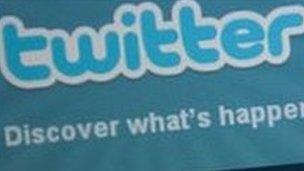Twitter user in bid to break super-injunctions
- Published

The Twitter user claimed to "out" a number of celebrities but some appeared to contain errors
A Twitter user has tried to unmask some celebrities who have obtained super-injunctions to prevent publication of details of their private lives.
The Twitter user claimed to "out" a number of UK public figures, but the tweets appeared to contain errors.
Campaigner Jemima Khan denied getting a super-injunction to stop publication of "intimate" photos of herself and Jeremy Clarkson, in her own Twitter response.
The tweets will add to concerns over injunctions and non-mainstream media.
Ms Khan issued her response on Twitter after the claims appeared on the micro-blogging website on Sunday.
She tweeted: "Rumour that I have a super injunction preventing publication of "intimate" photos of me and Jeremy Clarkson. NOT TRUE!"
In a later tweet, she said: "I hope the people who made this story up realise that my sons will be bullied at school because of it. Plus I'm getting vile hate tweets."
Super-injunctions have been issued by the courts to protect people from what they see as their right to privacy from the press. Even the fact that an injunction has been granted, or the name of the person applying for it, must be kept secret.
Some newspapers - and MPs - have attempted to challenge the court orders, suggesting it should be Parliament and not the courts which decide on the introduction of any privacy law.
Last month, Prime Minister David Cameron said the increasing use of such strict gagging orders made him feel uneasy.
A report by a committee set up by the Master of the Rolls - the most senior civil law judge at the Court of Appeal - will report on their use later this month.
BBC legal correspondent Clive Coleman said it will have to grapple with the issue of publication online.
"If it doesn't the super or secret-injunction may no longer be an effective tool in the administration of justice," he said.
'Nasty blackmail'
Media lawyer Charlotte Harris, of Mishcon de Reya, said the stories subject to super-injunctions were quite often cases of "nasty blackmail".
She said: "You should be allowed to end a relationship with somebody, whether you are married or not, without having that person say 'right, I'm going to go to the paper, I'm going to destroy your life, I'm going to tell everybody every intimate thing about you'.
"You should have some protection."
A lawyer who acts for newspapers suggested the "viral effect" of postings on social media websites could make a "mockery" of super-injunctions.
Niri Shan, head of media law at Taylor Wessing, added: "You can get an allegation that is made but before you know... it goes to potentially millions of people. Although people don't take these allegations as seriously as newspapers they certainly have a detrimental effect."
Helen Wood, the former escort girl caught up in one of the cases involving an actor, said super-injunctions allowed wealthy male celebrities to behave as they wanted and set a "bad example".
But she told BBC Radio 5 Live publishing "innocent" names on Twitter was the "wrong way to go about doing things".
"Injunctions have been put there for a purpose," she said.
"Obviously, I don't agree with them and I am certainly not a fan of them by any means, but to publicise them like that on Twitter without actual proof... I think they are doing the wrong thing."
- Published9 May 2011
- Published26 April 2011
- Published20 April 2011
- Published21 April 2011